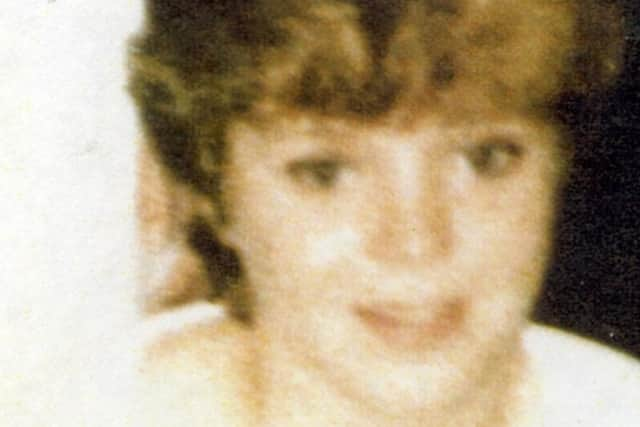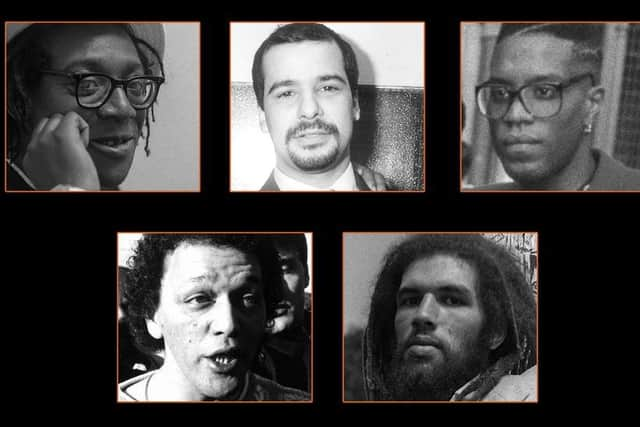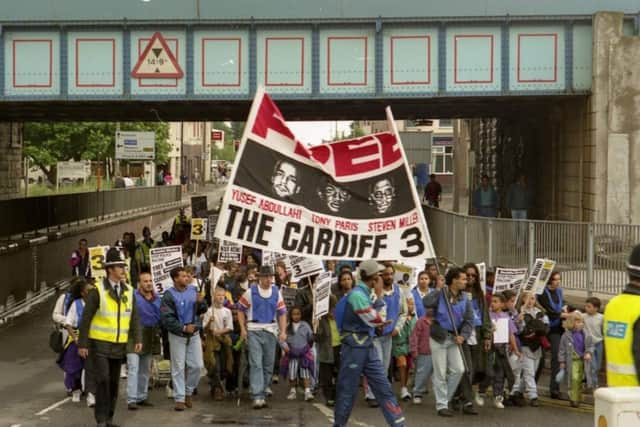Who are the Cardiff Five? Innocent suspects of Lynette White murder - and how Jeffrey Gafoor was caught


The BBC’s latest crime docu-series will explore the longest running murder trial in British history - that of the Cardiff five.
The case involved the wrongful charge of five black and mixed-race men over the murder of 20-year-old Lynette White, in 1988.
Advertisement
Hide AdAdvertisement
Hide Ad

Despite there being no DNA evidence to place any of the five men at the scene of the crime and several independent witnesses stating they saw a white lone-attacker leaving the crime scene, three of the five were convicted of her murder.
What was later described as one of the biggest miscarriages of justice in the UK would also see an investigation into police conduct which was tarred with missing evidence and witnesses who turned out to have been lying about the five men.
So, who were the so-called ‘Cardiff Five’ and where are they now? This is what you need to know.
Why were the Cardiff Five wrongly charged?
The Cardiff five were Lynette White’s boyfriend Stephen Miller, Tony Paris, Yusef Abdullahi, and cousins John Actie and Ronnie Actie.


Advertisement
Hide AdAdvertisement
Hide AdThe five were arrested and charged with the murder of sex worker Lynette White, who had sustained upwards of 50 stab wounds and had her throat slit in a horrific attack in an apartment on James Street, Cardiff.
The five were implicated by one of Lynette’s friends, Leanne Vilday, and a resident of a block of flats with an undisturbed view of the flat Lynette was killed in, Angela Psaila.
Psaila had been told by police that they had matched her blood to that found at the crime scene. The blood was in fact the same blood-type ‘AB’, but was later proven not to be Psaila’s.
She then implicated all five men in the murder, while also claiming she was involved.
Advertisement
Hide AdAdvertisement
Hide AdThe police re-interviewed Stephen Miller, who had an intellectual age of 11, and he finally confessed to Lynette’s murder.
His confession came after 19 interviews over four days, for a total of 13 hours. He was denied access to a solicitor for the first two interviews and had already denied the murder over 300 times.
How were the Cardiff Five acquitted?
The five men stood trial in October 1989, but after the sudden death of Mr Justice McNeill the trial had to begin again in 1990 before Mr Justice Leonard.
It was at the time the longest murder trial in British legal history, lasting 197 days.
Advertisement
Hide AdAdvertisement
Hide AdThe Actie cousins, who had already served two years in custody, were acquitted, The other three were convicted and sentenced to life imprisonment, becoming known as the ‘Cardiff Three’.
The men filed appeals in 1991. Miller’s was originally refused, however two witnesses discovered by an investigative journalist, were able to provide an alibi for Miller’s whereabouts at the time of the attack.
A public campaign to overturn the convictions, started by families and friends of the three men, reached the Court of Appeal.


Jurors heard how Miller was "bullied and hectored" by police during a "travesty of an interview" and that "short of physical violence, it is hard to conceive of a more hostile and intimidating approach by officers to a suspect."
Advertisement
Hide AdAdvertisement
Hide AdHis confession was omitted from the evidence. All three men had their convictions declared "unsafe and unsatisfactory" and were released.
In BBC’s new series ‘ A Killing in Tiger Bay’, Stephen Miller said his false confession which implicated the other men was “something I have to take to my grave with me.
"I’m a 22-year-old sitting in a police station, and they put me in this room and they just started flinging things at me - allegation after allegation - I mean it was so intense,” he said.
“I was a sorry soul - I think if they’d said God was in there with me, I’d have said yes.”
Advertisement
Hide AdAdvertisement
Hide AdFollowing the acquittal of the three men, the police failed to apologise for their conduct and claimed the men were guilty and had been released on a “legal technicality”. They refused to look for any other suspects.
In 2011, the largest ever UK police corruption trial was launched into the failings and wrong-doings of officers, detectives and an inspector for their conduct and allegedly corroborating falsehoods with ‘witnesses’ so as to convict the five men.
The case was dropped in 2012 when the prosecution failed to provide evidence, which had been allegedly shredded. Weeks after the case was dropped, the evidence showed up in the office of DCS Coutts, still in the original box sent from the IPCC.
The investigative journalist who first uncovered the two witnesses who provided alibi for Miller referred to the quashed investigation into police conduct as “a very, very sad day for justice,” adding: “it suggests you cannot ever prosecute police officers successfully if you can't do it in a case like this.”
Advertisement
Hide AdAdvertisement
Hide AdNone of the ten officers charged with perverting the course of justice were held accountable, and all of them were able to retire from the force.
Who killed Lynette White?
In 2001, the case was finally reopened as DNA advancement meant the killer’s profile found on her body and clothing was now traceable.
In January 2002, after the development of the Second Generation Multiplex Plus (SGM+) test, a 14-year-old relative of the murderer provided a partial match to the blood samples taken from the crime scene.
The teen was too young to have committed the crime, but his uncle was a perfect match.
Advertisement
Hide AdAdvertisement
Hide AdJeffrey Gafoor, aged 18 at the time of Lynette’s death, was arrested and charged with her murder.


On 4 July 2003, at Cardiff Crown Court, he pleaded guilty and was sentenced to life imprisonment, with a minimum tariff of twelve years and eight months.
Due to his guilty plea, he received less for his crime than that of the three men who were wrongly convicted.
Where are the Cardiff Five now?
Of the five men charged, only three are still alive – Stephen, Tony and John.
Advertisement
Hide AdAdvertisement
Hide AdYusef Abdullahi was treated for post traumatic stress disorder after his release from prison and spent the immediate years campaigning for the murder investigation to be reopened.
In 2011, Abdullahi died at the age of 49.
Cardiff solicitor Matthew De Maid, whose firm represented Mr Abdullahi during the Cardiff Five case, said Abdullahi “found life very difficult following his case and wrongful conviction.”
“He found it difficult to come to terms with life even after he was formally cleared,” Mr De Maid added.
In September 2007, Ronnie was found dead in his back garden. Police said there were no suspicious circumstances.
Advertisement
Hide AdAdvertisement
Hide AdTony Paris returned to Butetown, the area of Cardiff where the attack happened, some years later and said it will always be ‘home’.
The area is where his parents settled after coming to the UK from Nevis St Kitts not long before Tony was born in 1957. At the time, the area was known as Tiger Bay and was an area used to house ethnic minority families, following the 1960’s slum clearances.
In an interview with Jeremy Vine in 2016, he said: “I was brought up with all nationalities, all colours all religions. White boys, Black boys, Somali boys, Arab boys, Chinese boys, we didn’t see that, we were just docks boys.”
However, he said that being wrongfully convicted is “the worst thing you can ever imagine.”
Advertisement
Hide AdAdvertisement
Hide Ad“Emotionally, mentally there isn’t words to explain certain types of feelings when things happen to you,” Paris added.
John Actie, 60, also lives in Butetown and recently told WalesOnline: “My life hasn’t been normal for 30-odd years. It’s never going to be the same now even after all these years and the dust has settled. I was wronged, [the detectives] got away with it – I’m always going to be angry.”
The three men feature in the BBC docu-series, sharing how they were treated by officers and the impact it had on their lives.
The three part series, A Killing in Tiger Bay, will air weekly for three consecutive weeks, beginning on Thursday, 9 September at 9pm on BBC One.
